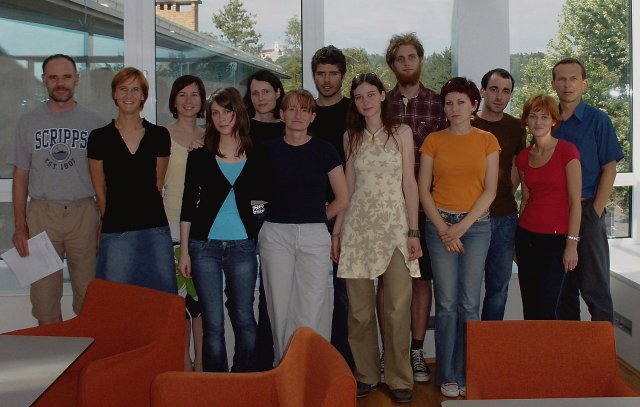Ljubljana
From 2007.igem.org
('Project in brief' added) |
|||
| Line 1: | Line 1: | ||
| + | == Project in brief == | ||
| + | |||
| + | Last year our team modified human cells by introducing a feedback device with a dominant-negative inhibitor under the control of the NFkapaB promotor, which decreased the damaging excessive response to the bacterial infection. In 2007, we are remaining in the domain of the potential applications of synthetic biology to improve human health. | ||
| + | |||
| + | The goal of our project is to design cells that will be able to detect the invasion of a pathogen and defend the organism by either undergoing apoptosis (and destroying the invaded pathogen before it can replicate) or by mounting any other defense response. To our opinion, the main innovative aspect of the project will be to detect the invasion of the pathogen not based on any particular sequence (which can be avoided through point mutations of the pathogen) but rather by relying on the ''function'' of the pathogen, which is essential for its survival or pathogenicity. The ultimate goal of this approach would be to develop gene therapy against infectious diseases. | ||
| + | <br> | ||
''' | ''' | ||
== Slovenian iGEM2007 team == | == Slovenian iGEM2007 team == | ||
Revision as of 15:36, 7 August 2007
Project in brief
Last year our team modified human cells by introducing a feedback device with a dominant-negative inhibitor under the control of the NFkapaB promotor, which decreased the damaging excessive response to the bacterial infection. In 2007, we are remaining in the domain of the potential applications of synthetic biology to improve human health.
The goal of our project is to design cells that will be able to detect the invasion of a pathogen and defend the organism by either undergoing apoptosis (and destroying the invaded pathogen before it can replicate) or by mounting any other defense response. To our opinion, the main innovative aspect of the project will be to detect the invasion of the pathogen not based on any particular sequence (which can be avoided through point mutations of the pathogen) but rather by relying on the function of the pathogen, which is essential for its survival or pathogenicity. The ultimate goal of this approach would be to develop gene therapy against infectious diseases.
Slovenian iGEM2007 team
Ljubljana team in June 2007 (photo taken in the new meeting room at the Natl. Institute of Chemistry).
First row: Saša, Mojca, Katja, Anja, Nives; Second row: Roman, Mateja, Karolina, Gabi, Peter, Andrej, Marko D. (missing on the photo is Marko B.)
undergraduate students:
Marko Bitenc - Biotechnology 3rd year
Peter Cimermančič - Biochemistry 3rd year
Rok Gaber - Microbiology 3rd year
Saša Jereb - Biochemistry 2nd year
Katja Kolar - Biochemistry 2nd year
Anja Korenčič - Biochemistry 4th year
Andrej Ondračka - Biochemistry 3rd year
instructors:
Roman Jerala - NIC - supervisor
Marko Dolinar - FCCT - supervisor
Mojca Benčina - NIC
Karolina Ivičak - NIC
Mateja Manček Keber - NIC
Gabriela Panter - NIC
Nives Škrlj - FCCT
